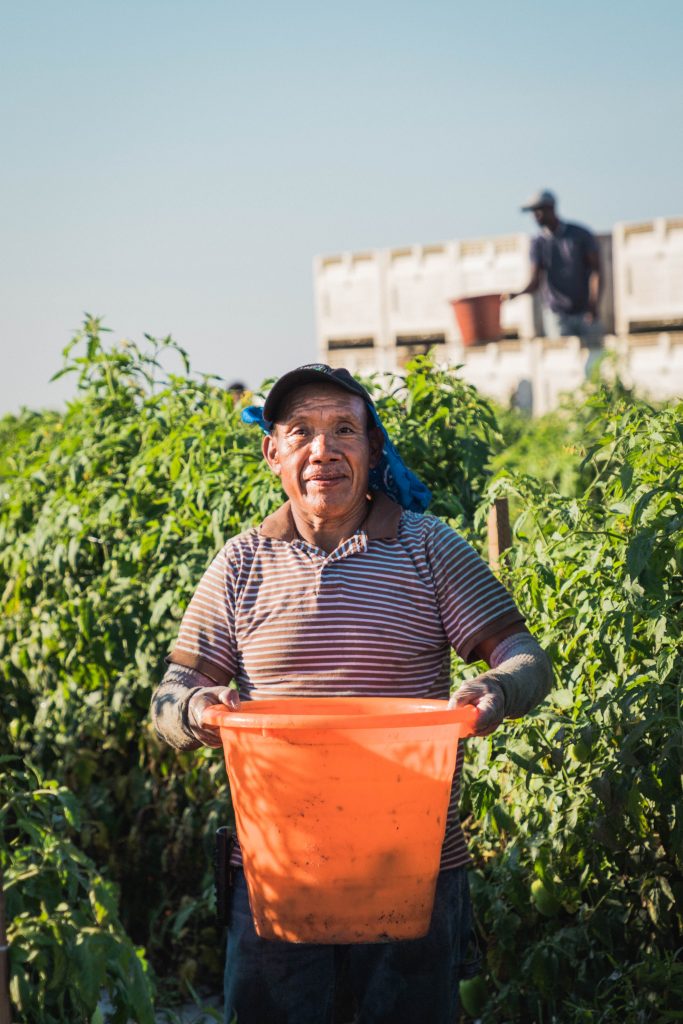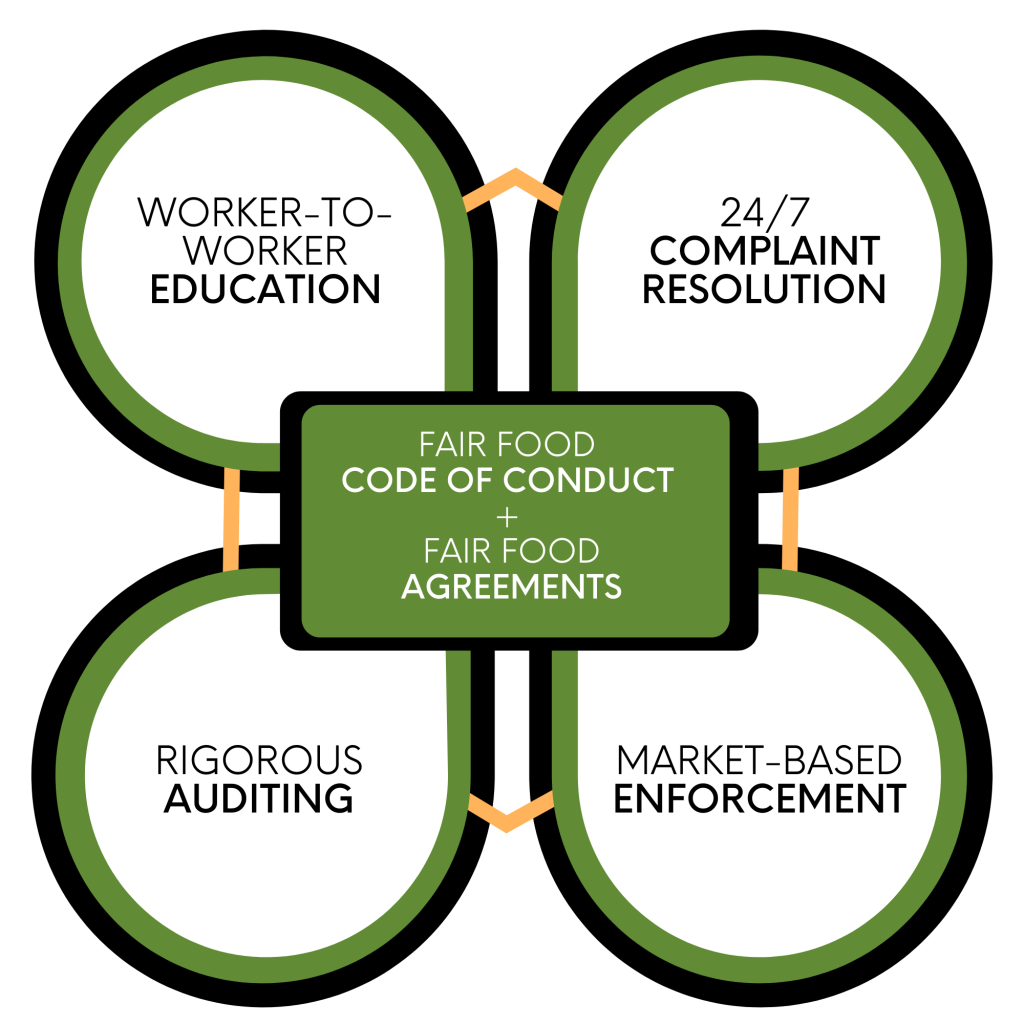ABOUT
The Fair Food Program is a partnership that benefits everyone in the supply chain: workers, growers, retailers, and consumers. Because of the Program’s unique approach, farmworkers can confidently report issues without fear, Participating Growers can swiftly and competently address any problems and learn to prevent them, and Participating Buyers can count on a secure and ethical supply chain.

WORKERS
benefit from the elimination of sexual assault, labor trafficking, and violence. Workers clock in and out, ensuring they are paid for all the hours they work, and benefit from improved working conditions (e.g., guaranteed protections around shade, water, bathrooms, pesticide exposure, excessive heat, and other health and safety issues).

GROWERS
receive purchasing preference from Participating Buyers, become employers of choice with reduced turnover, prevent risks, improve their management systems, and obtain verification of their ethical labor practices.

BUYERS
benefit from the transparency and elimination of supply chain risks at a time when consumers – in the age of instant information – increasingly demand to know the conditions under which their products are produced.
COMPONENTS OF THE
FAIR FOOD PROGRAM MODEL

Participating Growers and Buyers agree to implement the worker-informed “Code of Conduct,” which outlines all the protections for farmworkers in the program, as well as the Fair Food Premium.
Participating Buyers in the Fair Food Program commit to paying the Fair Food Premium on top of the regular price they pay for tomatoes. Since its inception, the Fair Food Program has added nearly $39 million to Participating Growers’ payrolls. The Fair Food Standards Council carefully tracks all Fair Food Premium payments through the supply chain and to its final distribution as a line-item bonus on workers’ paychecks.
The “Code of Conduct” covers all the protections for farmworkers in the program – from wages and hours, to freedom from retaliation, to health and safety protections. In 2020, the protections were expanded to include COVID-19 prevention and response. In 2021, the protections expanded again, to include heat stress illness prevention and response. The protections outlined come from the real experiences and expertise of farmworkers, who alone know the risks and most common abuses in the industry.
CIW conducts worker-to-worker education sessions at all Participating Growers’ farms throughout the season. The curriculum is developed and delivered by CIW farmworker staff.
In addition, upon hire, all workers receive the Know Your Rights and Responsibilities booklet and watch the accompanying video. The booklet was written by CIW and is available to workers in English, Spanish and Haitian Creole. Workers are paid by the farm for all time spent in Fair Food Program training.
Both the worker-to-worker and point-of-hire education are essential to providing workers with the information necessary to know and protect their rights under the Fair Food Code of Conduct. This helps workers identify abusive supervisors and potentially dangerous practices, preventing abuses before they occur. In this way, the Fair Food Program harnesses the power of thousands of trained and motivated monitors on the ground every day to ensure farms’ compliance with the Code of Conduct.
Open lines of communication between workers in the fields and growers overseeing vast operations from the office are essential to the success of the Fair Food Program. When workers encounter a potential violation of the Code of Conduct, the Program provides them access to a fast, effective and proven complaint process, with strict consequences for retaliation against workers who make a report.
The toll-free complaint line is answered by a bilingual Fair Food Standards Council investigator, 24 hours a day, 7 days a week. Complaints are investigated and resolved by FFSC, normally in collaboration with growers. Whenever possible, complaint resolutions include an educational component, consisting of meetings with relevant supervisors and crews, so that all workers on the farm can see that complaints are heard and resolved without retaliation, and the farm’s commitment to the Program is reconfirmed. All steps in the complaint process are documented in the FFSC database, resulting in an important compilation of information on the conduct of individuals, as well as company practices.
The Fair Food Standards Council is the dedicated third-party monitoring organization for the Fair Food Program. One of its principal tasks is to conduct in-depth audits on Participating Growers’ farms. With access to company records at the farm office level and access to the fields to observe harvesting operations and talk to workers first-hand, FFSC auditors are able to bring an unprecedented level of transparency to participating farms.
The Fair Food Code of Conduct is backed by binding agreements between CIW and many of the largest buyers of tomatoes in the world, from Burger King to Walmart. Participating Buyers are required to suspend purchases from growers who have failed to comply with the Code of Conduct. These agreements therefore provide a real market incentive for Participating Growers to abide by fair labor practices, resulting in unprecedented reforms in Florida’s tomato industry, including the successful elimination of forced labor in the fields. Sexual harassment, verbal abuse, and wage theft are now the exception, rather than the rule.
THE NEW GOLD STANDARD
Worker-Driven Social Responsibility
Unlike many traditional Corporate Social Responsibility models, and even many multi-stakeholder certification programs that rely on social auditing, the Fair Food Program is a human rights program that is designed, monitored, and enforced by the very workers whose rights it is intended to protect.
From extreme poverty to sexual harassment and even modern-day slavery, farmworkers have faced abuses at work for decades, even centuries. Because workers are the only actors in the supply chain with a vital and abiding interest in seeing that their rights are effectively monitored and enforced, they have, in the case of the Fair Food Program, constructed a system that actually works.